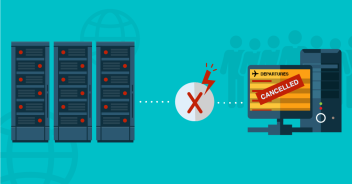IT Articles

IT Articles
IT Articles

Disaster recovery and business continuity both describe services that are vital to keeping you in business after an emergency. Which is better for your company? Businesses that don’t plan for disaster don’t last.Any number of unfortunate events can befall a business. Servers can crash without warning. Hackers can break through and destroy (or hold hostage) the data that is the lifeblood of a modern business. Natural disasters can wipe out not just data but the whole building. Recovering from disasters requires planning. Data backups are not a disaster recovery plan.Many businesses operate on the…

Business continuity drills are an organizations best tool to detect, analyze and improve their weakest link in the operating chain. The common phrase “practice makes perfect” remains true in the IT world. Business continuity drills allow an organization to review their current operating system and the detrimental impacts that could occur should an accident or threat cause them to halt operations. Periodic business continuity drills identify gaps in process dependencies and allows your organization to build safeguards to improve incident response rate. Below we will breakdown different business continuity drills and walk you through…

Business continuity planning (BCP) involves the process of building a set of systems that prevent and recover your business operating procedures from potential threats. This comprehensive plan works to ensure all personnel and assets have a set of procedures to follow to quickly get your business operational in the wake of a disaster. Business continuity plans are created before an incident takes place and involves key stakeholder’s input. BCP plans attempt to define all risks that can impact a business’ ability to operate, and it lists specific responses for each event. This makes…

Network Downtime is bad for business. Whether you agree or not, it’s a fact – just a couple years ago, small businesses with up to 50 million in annual revenue reported that just a single hour of downtime cost them $8,600. If your company is reliant on technology, any IT downtime could result in detrimental revenue loss, a significant decrease in productivity, and a negative customer experience. What Is the Meaning of Downtime? There are multiple ways you can define downtime, but it is most commonly defined as the time in which a machine,…

Most business owners are aware that downtime is inevitable as interruptions can take on many forms – from virus infections to power outages to floods to human errors. Would you be prepared to lose access to your data and applications tomorrow? How long would you be able to continue operating in a profitable manner? Traditional backups, such as tape, disk, and NAS devices, are often used as a method of recovering, however, this is a timely, expensive, and often unpredictable option. Did you know the average data loss incident takes 7 hours to recover from and…

Small to mid-sized businesses are not immune to the likelihood of crippling events similar to the Delta debacle. Imagine it’s the middle of a busy work day and your entire data system suddenly goes down. Boom. Work comes to a standstill. Customers are put on hold. Order fulfillment stops. End of month invoicing to keep the cash flow going? Forget it. Without a proven server backup and recovery solution, you could have a networking nightmare on your hands. There will be loss of revenue that will not be recovered, not to mention customer dissatisfaction…

You’re a positive person. We think that’s spectacular. And though remaining positive is great in principle, sadly it isn’t always a smart risk management mindset. The companies that subscribe to Murphy’s Law are generally best equipped to mitigate risk and handle the unknowns – whether that’s economic downturns, natural disasters, data breaches or server failures. Regardless of risk appetite, smart companies plan against interruptions to business with what’s known as a Business Continuity Plan or BCP. A Business Continuity Plan evaluates how your company will sustain operations, communicate to personnel and clients, and generally weather the…

Many businesses are required by law to have Disaster Recovery and Business Continuity Plans. Is yours one of them? For some businesses, disaster planning is low on their list of priorities. But for many others, establishing a contingency plan is anything but optional. Critical organizations (especially those in health care, financial, and government sectors) are often required by law to be able to weather any storm with their operations and data intact — or else face steep penalties from federal, state, or local governments. The problem is, some business professionals are not fully aware of the laws and regulations that…




